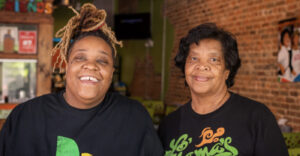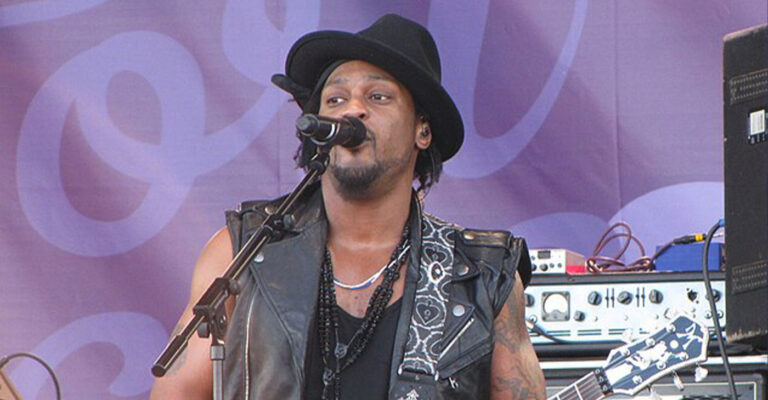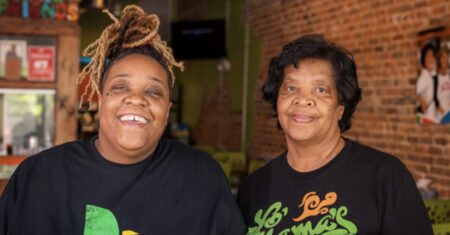By Lauren Burke
Michael Eugene Archer—known to the world as D’Angelo—was one of the most enigmatic and transformative figures in modern R&B. D’Angelo attended Huguenot High School in Richmond, Virginia. He dropped out in 1991 to move to New York City and pursue what would become an incredibly successful career in music. Today, it was learned that the singer died in New York after a quiet battle with pancreatic cancer. He was 51. Though he only had three studio albums, D’Angelo won four Grammys during his career. The singer was said to be working on what would have been his fourth studio album. “An architect, musically and spiritually. I’m stumped on this one. We haven’t just lost a person, we’ve lost a musician who put his all into the music,” said music critic Nicolas-Tyrell Scott on social media.
D’Angelo was born on February 11, 1974, in Richmond and raised in nearby Petersburg. He emerged in the 1990s as a singing phenom with his church-honed musicianship and husky falsetto. The singer had a deep reverence for the Black musical tradition, and he reshaped the landscape of soul music that would begin an era of what would be called “neo-soul.” D’Angelo was the son of a minister and grew up immersed in gospel music. He learned the piano at an early age and often played during his father’s services. The early blend of faith, rhythm, and improvisation became the foundation for his sound—a blend of spirituality, sensuality, and streetwise funk. As a teenager, he was deeply inspired by Prince, Marvin Gaye, Al Green, and Curtis Mayfield, as well as the jazz-infused textures of Miles Davis and Herbie Hancock. By his late teens, D’Angelo was already writing and producing his own material, displaying a rare ability to bridge old-school soul with contemporary rhythms. D’Angelo’s big breakthrough came in 1995 with the release of Brown Sugar, a debut album that felt both nostalgic and radical. Driven by hits like “Lady,” “Cruisin’,” and the title track “Brown Sugar,” the record was a warm, analog antidote to the digital R&B dominating radio at the time. Critics hailed D’Angelo as a savior of soul, comparing him to the greats of the 1970s. The album went platinum and established him as a leading voice of the emerging neo-soul wave alongside artists like Erykah Badu, Maxwell, and Lauryn Hill.
D’Angelo’s follow-up album, Voodoo (2000), cemented his status as a visionary singer. Recorded over several years at Electric Lady Studios in New York—a space once home to Jimi Hendrix—Voodoo was a sprawling, live-instrument masterpiece that blurred the lines between R&B, funk, hip-hop, and jazz. The album’s grooves, shaped with members of The Soulquarians collective (including Questlove, James Poyser, and Q-Tip), showcased D’Angelo’s mastery of nuance and groove. The latter, accompanied by a famously minimalist and sensual video, became an instant cultural moment—though it would also contribute to his eventual retreat from the spotlight. In the years following Voodoo, D’Angelo struggled under the weight of fame, artistic expectation, and personal demons. The intense sexualization of his image, coupled with his perfectionist tendencies and distrust of the music industry, led to a lengthy hiatus from the business. Legal troubles and personal struggles kept him largely out of the public eye for a decade. Fans and critics wondered whether one of soul’s brightest stars would be seen on stage again.
But in 2014, D’Angelo resurfaced unexpectedly with the album Black Messiah. The work was a politically charged, adventurous release amid the news of the justice reform protests in Ferguson, Missouri. The album, credited to D’Angelo and The Vanguard, was an urgent exploration of Black identity and resistance. D’Angelo had not lost his edge, and Black Messiah was hailed as a masterpiece and later won a Grammy Award for Best R&B Album in 2016. D’Angelo’s influence is seen across generations. Artists such as Frank Ocean, H.E.R., and SZA cite D’Angelo as an inspiration. His ability to channel vulnerability, sensuality, and social consciousness and blur musical boundaries was recognized by many in the industry.
Despite his limited output — only three studio albums in 30 years —D’Angelo’s impact on Black music is large. He stood as a bridge between musical eras: a torchbearer for the soul greats of the past and a north star for those carrying the sound forward. D’Angelo was reclusive but remained revered and well respected by many. In May, Billboard magazine reported that D’Angelo dropped out of the 2025 Roots Picnic in Philadelphia, citing medical complications related to a previous surgery. On Friday, May 23, the singer announced through social media that he would not be headlining the Roots Picnic event from May 31 to June 1 in Philadelphia.







